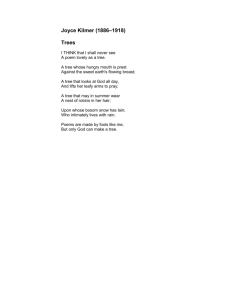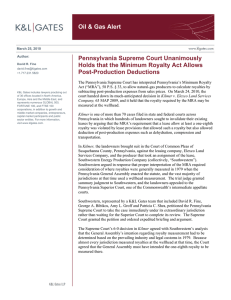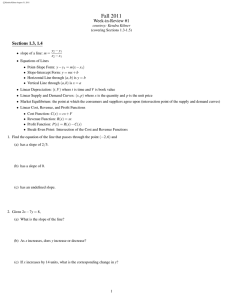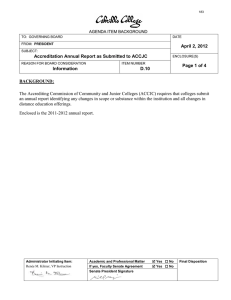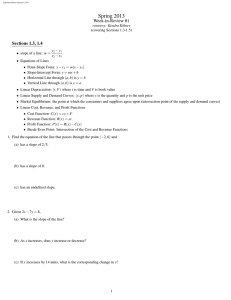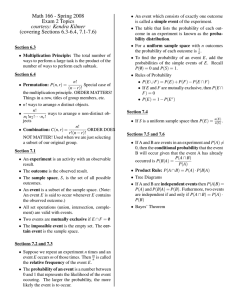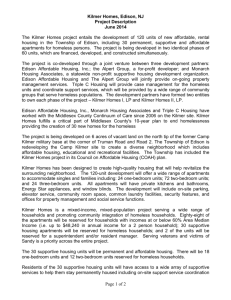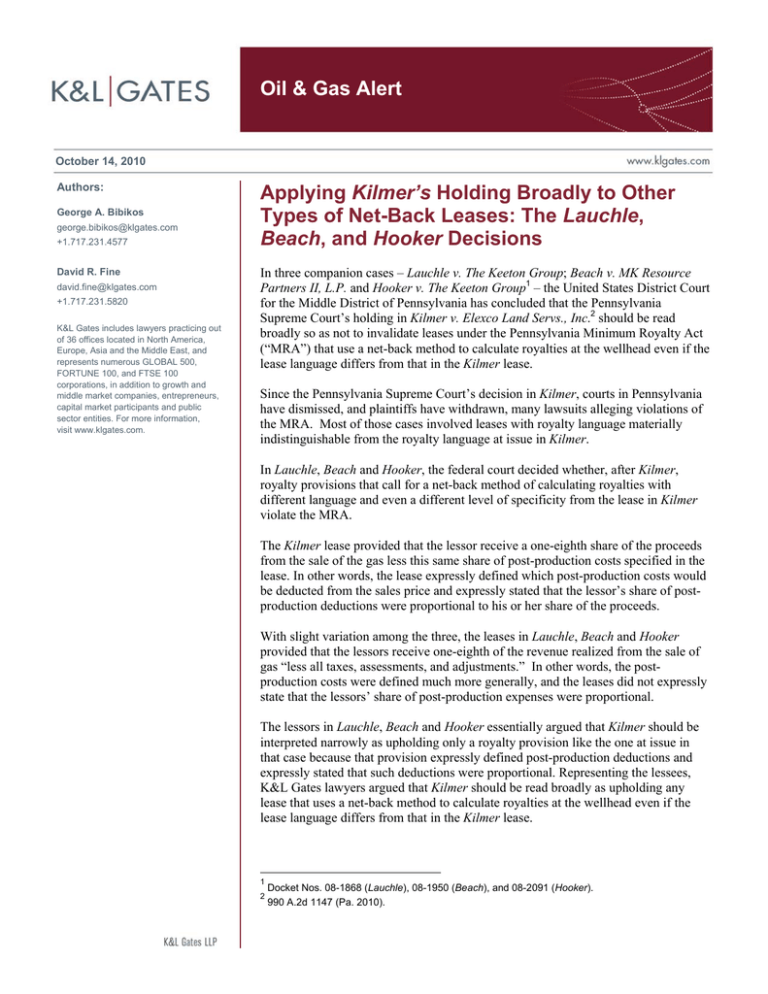
Oil & Gas Alert
October 14, 2010
Authors:
George A. Bibikos
george.bibikos@klgates.com
+1.717.231.4577
David R. Fine
david.fine@klgates.com
+1.717.231.5820
K&L Gates includes lawyers practicing out
of 36 offices located in North America,
Europe, Asia and the Middle East, and
represents numerous GLOBAL 500,
FORTUNE 100, and FTSE 100
corporations, in addition to growth and
middle market companies, entrepreneurs,
capital market participants and public
sector entities. For more information,
visit www.klgates.com.
Applying Kilmer’s Holding Broadly to Other
Types of Net-Back Leases: The Lauchle,
Beach, and Hooker Decisions
In three companion cases – Lauchle v. The Keeton Group; Beach v. MK Resource
Partners II, L.P. and Hooker v. The Keeton Group1 – the United States District Court
for the Middle District of Pennsylvania has concluded that the Pennsylvania
Supreme Court’s holding in Kilmer v. Elexco Land Servs., Inc.2 should be read
broadly so as not to invalidate leases under the Pennsylvania Minimum Royalty Act
(“MRA”) that use a net-back method to calculate royalties at the wellhead even if the
lease language differs from that in the Kilmer lease.
Since the Pennsylvania Supreme Court’s decision in Kilmer, courts in Pennsylvania
have dismissed, and plaintiffs have withdrawn, many lawsuits alleging violations of
the MRA. Most of those cases involved leases with royalty language materially
indistinguishable from the royalty language at issue in Kilmer.
In Lauchle, Beach and Hooker, the federal court decided whether, after Kilmer,
royalty provisions that call for a net-back method of calculating royalties with
different language and even a different level of specificity from the lease in Kilmer
violate the MRA.
The Kilmer lease provided that the lessor receive a one-eighth share of the proceeds
from the sale of the gas less this same share of post-production costs specified in the
lease. In other words, the lease expressly defined which post-production costs would
be deducted from the sales price and expressly stated that the lessor’s share of postproduction deductions were proportional to his or her share of the proceeds.
With slight variation among the three, the leases in Lauchle, Beach and Hooker
provided that the lessors receive one-eighth of the revenue realized from the sale of
gas “less all taxes, assessments, and adjustments.” In other words, the postproduction costs were defined much more generally, and the leases did not expressly
state that the lessors’ share of post-production expenses were proportional.
The lessors in Lauchle, Beach and Hooker essentially argued that Kilmer should be
interpreted narrowly as upholding only a royalty provision like the one at issue in
that case because that provision expressly defined post-production deductions and
expressly stated that such deductions were proportional. Representing the lessees,
K&L Gates lawyers argued that Kilmer should be read broadly as upholding any
lease that uses a net-back method to calculate royalties at the wellhead even if the
lease language differs from that in the Kilmer lease.
1
2
Docket Nos. 08-1868 (Lauchle), 08-1950 (Beach), and 08-2091 (Hooker).
990 A.2d 1147 (Pa. 2010).
Oil & Gas Alert
The federal court adopted the lessees’ arguments
regarding the proper interpretation of the MRA and
Kilmer and how the statute and ruling should apply
to leases that differ from the Kilmer lease. At the
outset of its analysis, the court explained the Kilmer
holding as follows:
•
“The holding of Kilmer is that the GMRA
permits the calculation of the royalties at the
wellhead utilizing the net-back method.”
•
Kilmer “is properly read broadly[.]”
•
Kilmer “cannot be strictly applied only to leases
that are on all fours to the lease in Kilmer.”
The court then rejected the lessors’ suggestion that
Kilmer should be read narrowly, offering the
following helpful explanation as to why a narrow
reading would not work:
We cannot imagine that the Pennsylvania
Supreme Court, after granting expedited
consideration and jurisdiction, meant to
render a holding so narrow as to invite its
consideration of myriad other cases
involving leases that were not entirely
identical to the Kilmer lease. We empathize
with Plaintiffs’ desire to escape what they
consider to be bad bargains. But they have
put too fine a point on Kilmer in aid of
voiding their leases. Both the Pennsylvania
Supreme Court, and this Court, recognizes
the need for finality. A holding contrary to
the one we render today would trigger
havoc in a multi-billion dollar industry.
More importantly, it would be in error.
Applying Kilmer broadly, the court concluded that
(1) “taxes, assessments, and adjustments” are all
proper post-production expenses; (2) the lease
language authorizes these deductions from the sales
price as in any other net-back lease; and (3) because
the leases provide for a net-back method of
calculating royalties at the wellhead, they are valid
under the MRA as interpreted by Kilmer.
The federal court’s decision confirms what the
industry has urged in the MRA cases that remain
after the Pennsylvania Supreme Court decided
Kilmer. Leases are not identical. Royalty
provisions are not uniform. Yet, many of them
provide for a net-back method of calculating
royalties at the wellhead. The federal court in
Lauchle, Beach and Hooker confirms that the
Kilmer holding should be read broadly so as not to
invalidate leases under the MRA that in function
guarantee at least a one-eighth royalty at the
wellhead as required by the MRA and Kilmer,
regardless of the language used in the lease to get to
that point.
Anchorage Austin Beijing Berlin Boston Charlotte Chicago Dallas Dubai Fort Worth Frankfurt Harrisburg Hong Kong London
Los Angeles Miami Moscow Newark New York Orange County Palo Alto Paris Pittsburgh Portland Raleigh Research Triangle Park
San Diego San Francisco Seattle Shanghai Singapore Spokane/Coeur d’Alene Taipei Tokyo Warsaw
Washington, D.C.
K&L Gates includes lawyers practicing out of 36 offices located in North America, Europe, Asia and the Middle East, and represents numerous
GLOBAL 500, FORTUNE 100, and FTSE 100 corporations, in addition to growth and middle market companies, entrepreneurs, capital market
participants and public sector entities. For more information, visit www.klgates.com.
K&L Gates comprises multiple affiliated entities: a limited liability partnership with the full name K&L Gates LLP qualified in Delaware and
maintaining offices throughout the United States, in Berlin and Frankfurt, Germany, in Beijing (K&L Gates LLP Beijing Representative Office), in
Dubai, U.A.E., in Shanghai (K&L Gates LLP Shanghai Representative Office), in Tokyo, and in Singapore; a limited liability partnership (also named
K&L Gates LLP) incorporated in England and maintaining offices in London and Paris; a Taiwan general partnership (K&L Gates) maintaining an
office in Taipei; a Hong Kong general partnership (K&L Gates, Solicitors) maintaining an office in Hong Kong; a Polish limited partnership (K&L
Gates Jamka sp.k.) maintaining an office in Warsaw; and a Delaware limited liability company (K&L Gates Holdings, LLC) maintaining an office in
Moscow. K&L Gates maintains appropriate registrations in the jurisdictions in which its offices are located. A list of the partners or members in each
entity is available for inspection at any K&L Gates office.
This publication is for informational purposes and does not contain or convey legal advice. The information herein should not be used or relied upon
in regard to any particular facts or circumstances without first consulting a lawyer.
©2010 K&L Gates LLP. All Rights Reserved.
October 14, 2010
2

